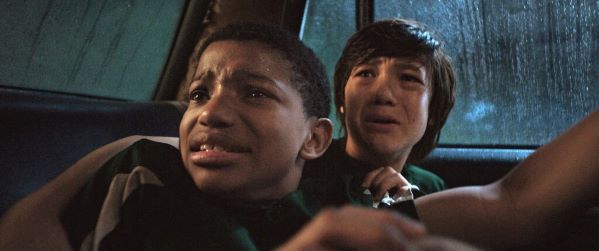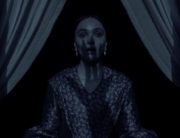

Shudder’s latest film, The Boy Behind the Door, is unquestionably a survival horror story. Heavy on action and light on exposition, it dumps us into a horrific kidnapping in which the protagonist must save himself and a friend from openly amoral perpetrators. Think Resident Evil 7, but with true human foes instead of supernatural threats. Oh, and for added horror and suspense, our main characters are both boys.
When we meet Bobby (Lonnie Chavis) and his best friend, Kevin (Ezra Dewey), they are tied up in a car, gagged, and separated from one another. Before this traumatizing start, the boys were just minding their business on a sunny day, tossing a baseball around on a hill and talking about moving to California when they get older, or just anyplace that invokes good memories. Their friendship is a kind one that avoids stereotypes—Bobby is black, Kevin is white—and what brief moments we see of them at first make you believe these two truly care about one another. However, after Kevin takes too long retrieving the ball, Bobby goes out looking for him, only to be knocked out by an unknown figure.
Upon escaping, Bobby finds himself in an isolated farmhouse surrounded by oil rigs. By all accounts, he has a golden opportunity to leave and get help. What stops him from running off immediately, though, is Kevin, who’s trapped in a locked room within the house and unable to escape because of an ankle chain. In other words, there’s more than one lock they need to pick, and the keys’ holder, an adult, has the physical advantage.
Initially, Bobby only needs to evade the kidnapper, an older man unaware of his escape. The film, thankfully, uses this first act to show that the adolescent is neither clueless nor naïve about surviving these circumstances. He knows how to hide, when to fight back, and even masters a rotary dial phone to call 911 when the coast seems clear. This kind of logical agency is pretty rare for horror movie characters, particularly kids, so Bobby’s quick thinking and versatility feel refreshing and accentuate his moments of terror when things go wrong. The tension escalates when the abductor’s partner returns to the house, someone who proves far more willing to hurt the boys if they step out of line, effectively giving the movie a pseudo-slasher villain.
Good horror often depends as much on its geography and sound as it does the actual monster, a trait directors David Charbonier and Justin Powell (The Djinn) have kept to heart. The farmhouse provides a winding series of corridors and rooms that Bobby revisits with each new obstacle, familiarizing us with areas to the point that we can sense which rooms are safe and which warrant caution. Darkly lit and eerily scored, the atmosphere is chilling precisely because outwardly the surroundings look so normal, including the kidnappers’ identities.
Some horror references come across as too obvious—specifically a confrontation between Bobby and the captor in a bathroom that leads to a complete imitation of The Shining’s own bathroom door scene, sans a “Here’s Johnny” remark. But they all contribute to a growing sense of claustrophobia, where one step toward escape results in two more hindrances thwarting Bobby and Kevin’s path to freedom.
Watching this film is a morbid endeavor, no matter how well crafted. Both kids go through immense moments of bodily harm—knife cuts, nails chipped off, flesh wounds—that might be too much for some viewers, and while Dewey gets less to do than Chavis early on, his actions during the third act prove quite beneficial to the duo’s survival. Details about the kidnappers’ mindsets, however, don’t really contribute much to the film’s structure. A MAGA bumper sticker and xenophobic radio channel in the car hint at their politics, while later on, one of them makes a racist statement.
What The Boy Behind the Door offers in terms of horror cinema is lean, straightforward, and gruelingly successful. It establishes stakes, coats them in a foreboding atmosphere, and makes great use of the environment to make each of Bobby’s subsequent actions feel meaningful. The idea of two children getting kidnapped on a whim is chilling enough. By placing us directly in their shoes, Charbonier and Powell make it downright nail-biting.
















Leave A Comment